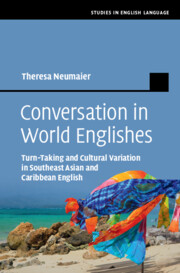 Conversation in World Englishes
Conversation in World Englishes Book contents
- Conversation in World Englishes
- Conversation in World Englishes
- Copyright page
- Dedication
- Contents
- Figures
- Tables
- Acknowledgements
- Abbreviations
- Transcription Conventions
- Chapter 1 Introduction
- Chapter 2 Investigating Talk-in-Interaction in Culture
- Chapter 3 Codifying Patterns of Interaction
- Chapter 4 Turn Allocation in Southeast Asian and Caribbean English Conversations: Forms, Contexts, and Frequencies
- Chapter 5 Turn-Claiming and Turn-Holding Resources in Southeast Asian and Caribbean English Conversations
- Chapter 6 Turn-Claiming and Turn-Holding: Strategy Clusters
- Chapter 7 Cooperation or Fights for the Floor?
- Chapter 8 Conclusion and Outlook
- References
- Index
Chapter 5 - Turn-Claiming and Turn-Holding Resources in Southeast Asian and Caribbean English Conversations
Published online by Cambridge University Press: 30 March 2023
- Conversation in World Englishes
- Conversation in World Englishes
- Copyright page
- Dedication
- Contents
- Figures
- Tables
- Acknowledgements
- Abbreviations
- Transcription Conventions
- Chapter 1 Introduction
- Chapter 2 Investigating Talk-in-Interaction in Culture
- Chapter 3 Codifying Patterns of Interaction
- Chapter 4 Turn Allocation in Southeast Asian and Caribbean English Conversations: Forms, Contexts, and Frequencies
- Chapter 5 Turn-Claiming and Turn-Holding Resources in Southeast Asian and Caribbean English Conversations
- Chapter 6 Turn-Claiming and Turn-Holding: Strategy Clusters
- Chapter 7 Cooperation or Fights for the Floor?
- Chapter 8 Conclusion and Outlook
- References
- Index
Summary
This chapter provides an in-depth analysis of the resources Southeast Asian and Caribbean speakers of English use to claim or hold a turn at talk. Four larger strategy groups are described and compared: latches and overlaps, phonetic resources, lexical resources, and syntactic strategies. The chapter describes how these are realised by the individual speaker groups and compares this to previous research on Inner Circle Englishes. It can be shown that speaker groups essentially have access to the same set of resources but exhibit different preferences with respect to which strategies they prefer for organising turn-taking in conversational interaction.
Keywords
- Type
- Chapter
- Information
- Conversation in World EnglishesTurn-Taking and Cultural Variation in Southeast Asian and Caribbean English, pp. 106 - 221Publisher: Cambridge University PressPrint publication year: 2023
